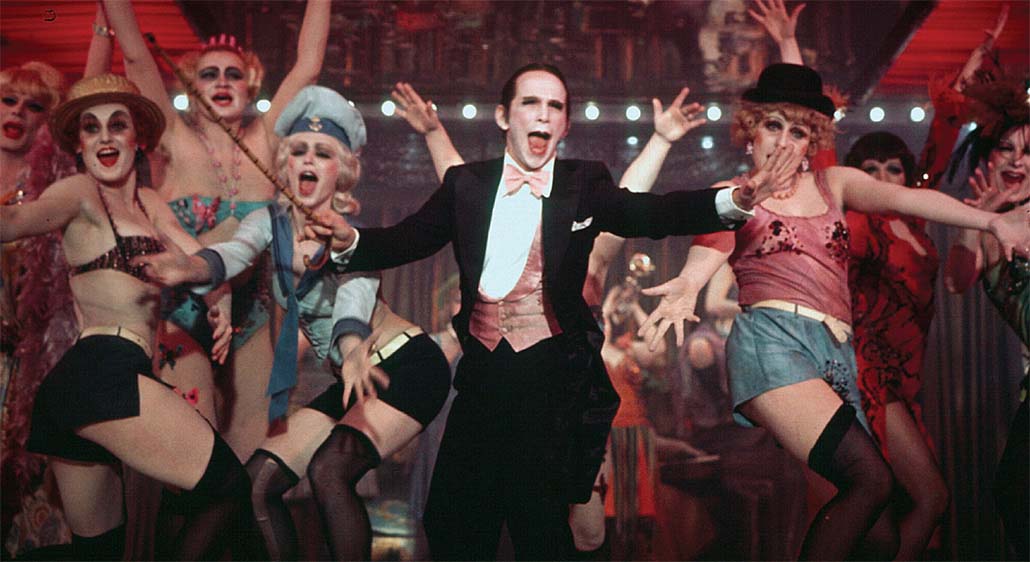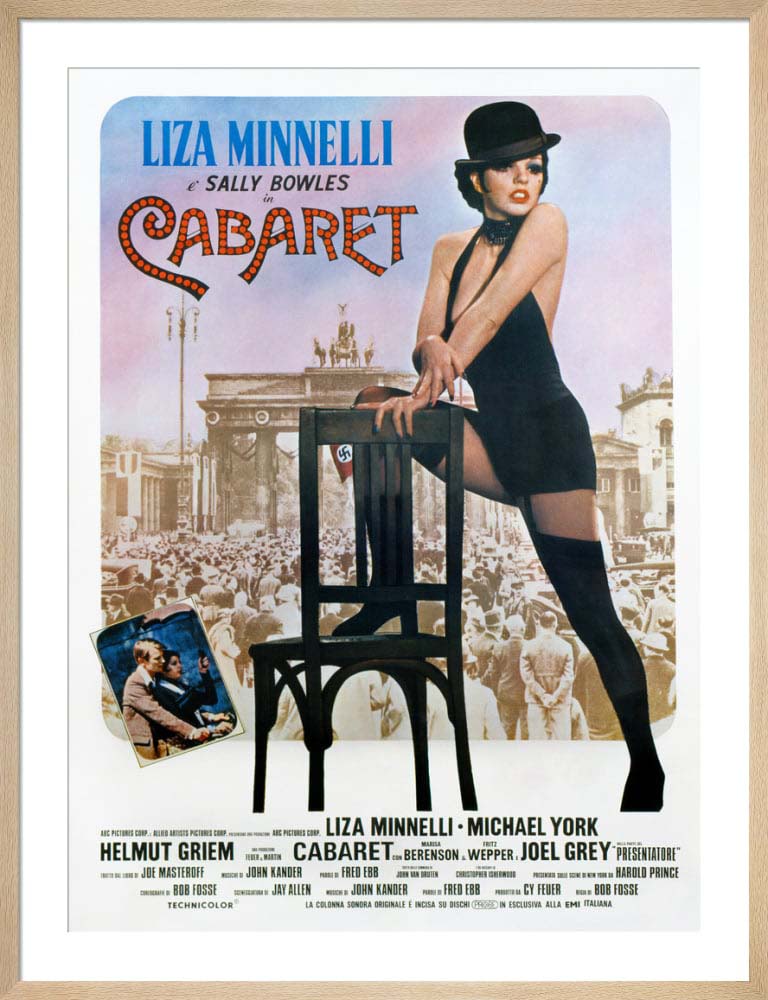- Opinion
- 20 May 25
Cabaret and the rise of the Nazis: "The Roaring 20s came and went a century ago, but there are eerie and very worrying parallels with today"

Elements of a work that had an anti-fascist messsage at its core, are now being usurped by a new breed of Nazis, who have gathered momentum in far too many countries for comfort…
We’ve been thinking of Cabaret up here on Hog Hill this week. The film of the musical, that is. The trigger was a random sighting of a group of young people chatting at a crossroads in Dublin.
One of them had meticulously barbed hair. His clothes matched perfectly, a high-ish waist hinting at the 1920s and 1930s and yet very much of the day that was in it.
He reminded us of Brian Walker, as played by Michael York in the movie that made a global superstar of Liza Minnelli.
Walker is a buttoned-up Brit who meets good-time gal Sally Bowles, played by Minnelli, and Max von Heune, a wealthy playboy baron.
The plot follows the threesome, and others, as the Weimar Republic ebbs, and the Nazis rise.
1920s Berlin was pretty relaxed, a byword for liberal ideas, new forms of expression and hedonism. The city’s cabarets were giddy hubs of high living, theatricality, music and dance.
As the movie ends, Nazis have taken the favoured seats in the Kit Kat Club. One historical epoch has replaced another.
The Roaring 20s came and went a century ago, but there are eerie and very worrying parallels with today.
Back then, the nascent Soviet state was mired in a bloody civil war, much of it criss-crossing Ukraine.
The Ottoman empire had collapsed, abandoning Palestine, fatally, to the UK to administer, paving the way for the fabrication of a Jewish homeland – and thus unintentionally setting in motion the great tragedy that we see unfolding now in Gaza.
The big wheel spins and spins.

SLIPPERY ALLIANCES
Across the Atlantic, the USA had returned to isolation and mercantilism after World War I. Warren Harding won the presidency in 1920 with a promise to keep the US out of global affairs.
So, the US didn’t join the League of Nations, even though it originated in an American proposal. Rather, its energy went into supporting business growth, imposing tariffs on imports and limiting immigration.
Sound familiar?
Its political culture genuflected towards the ideals of its 18th century founders, and was heavily influenced by Christian evangelism and a strong temperance movement.
The 18th amendment to the US constitution, to prohibit the sale and consumption of alcohol outright, came into effect on 16 January 1920.
Counter-intuitively, that’s when the Roaring 20s, aka the Jazz age and the Prohibition era, took off.
From an economic perspective it was a decade of feral capitalist insanity and manic over-exuberance.
Everything seemed shiny and new – including cars and planes, production methods and materials and design.
Eyes focused on the future, on technology, engineering, science, architecture, and machines – including buildings as machines to live in.
There were new art forms in music, design, visual arts, fashions and style.
A whole new African-American world began to emerge, especially in music and dance.
But behind this tumult, darker forces were making hay.
Prohibition made mobsters rich and nurtured slippery alliances between nouveau riche business moguls, politicians and gangsters, and new sports and entertainment celebrities.
In Europe conservatives were seduced by far right movements in Portugal, Spain, and Italy as well as Germany, Austria and middle Europe.
While Russia’s civil war eventually ended with the formation of the USSR, the butchery continued as Stalin took, and brutally consolidated, power.

CULTURE OF INTOLERANCE
In Palestine, the British began to facilitate the immigration of European Jews. Between 1922 and 1935, the Jewish population there rose from nine percent to nearly 27 percent of the total population.
And in Germany, notwithstanding the wild time everyone seemed to be having, deep resentment had been festering at the terms of the Treaty of Versailles, agreed at the end of the First World War.
The whole house of cards came crashing down in 1929, as the mors sanguine had predicted, triggering the Great Depression, an economic catastrophe that had a huge global impact.
In the US, its effects were greatly magnified by the Dust Bowl crisis caused by over-farming, heat and drought in Oklahoma, Kansas, Arkansas and Texas.
Crops failed, farms died, people fled. It’s estimated that by 1940, 2.5 million of these climate refugees had left the Plains states. Of those, 200,000 headed for California.
They weren’t welcome there, as you can hear in Woodie Guthrie’s great song, ‘Do-Re-Mi’.
That was in the isolationist, nativist USA. In Europe, things were moving in a different, even more calamitous direction.
Cabaret, the movie, ends with a blonde boy, with a very 2025 haircut, singing ‘Tomorrow Belongs to Me’ in a Berlin beer garden.
It seems pastoral and sunny but each verse ends with an exhortation or threat: “Gather together to meet the storm/ Tomorrow belongs to me.”
Then we see that the boy is wearing a Hitler Youth uniform. The song becomes a Nazi anthem – and by the end everyone is singing along.
Well, here we are again. But are we doomed to make the same mistakes?
Is it really true that the more things change, the more they remain the same?
Maybe.
The social culture of the last two decades has been derided as one of self-absorption, with people tending to live in the present, increasingly in thrall to the selfie.
The notional theme tune is ‘Today Belongs to Me’.
The image is not entirely true. After all, in Ireland we made significant strides towards equality, the exposure and resolution of past misdeeds (for example in Magdalen Laundries) and the commitment to making peace a way of life rather than a project.
Yet, there’s no denying that the global focus has shifted very much to the right in 2025.
JEWISH AND GAY
Values have slipped. What was once unsupportable is now accepted with arch cynicism.
The promise of the early internet, and indeed nascent social media, was optimistic, to make everyone better informed, more knowledgeable and more aware, the world more equal and fair, and citizens happier and more fulfilled.
That’s not how you’d see it now, is it? Instead, what we have is a divisive, hate-filled arena controlled by the new breed of Tech Oligarchs.
As was the case a century ago, the combination of very rapid and all-consuming technology, climate change and population dispersal are triggering huge disruption, which is used to justify a new culture of intolerance, aggrandisement, brutalism, militarisation and killing fields.
By and large, the global oligarchy has jettisoned any semblance of moral compass, compassion or conscience.
As ever, ironies abound.
Cabaret, and by extension ‘Tomorrow Belongs to Me’, was an anti-fascist work when written in 1966.
But the song has now been embraced by the far-right, for example in Austria, as though the movie was written to support Nazi-ism.
Another irony: its composers, John Kander and Fred Ebb, were Jewish and gay. Nazis would have hated them on both counts. But the truth doesn’t matter now. Lies can be made to stick if they are repeated often enough.
There are many versions of history out there. Most of them are false. We all have to build, sharpen and maintain our ability get past all the bullshit.
History doesn’t have to repeat. The forces of darkness have no claim on tomorrow.
We’ll fight Kerry style. Fly at ‘em out of the light!
• The Hog
RELATED

- Opinion
- 18 Feb 26
Irish Government to confirm social media ban on under 16s today

- Sex & Drugs
- 18 Feb 26








